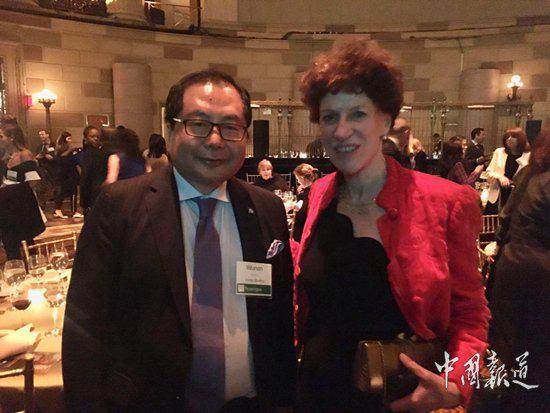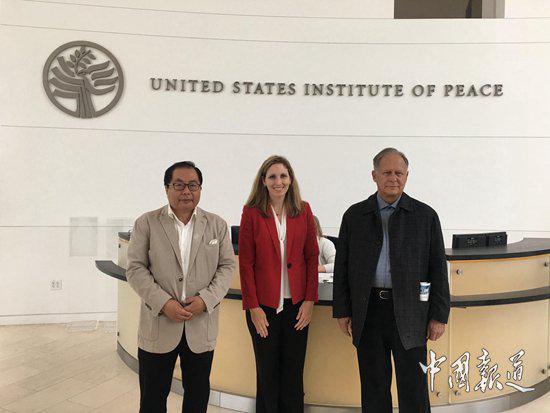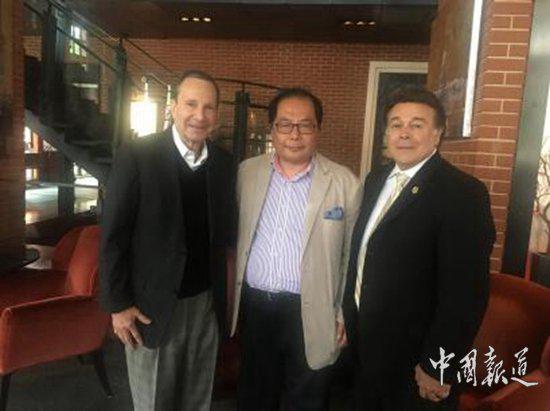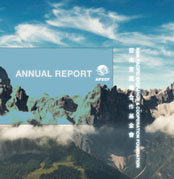June 2nd, 2017
Add Building Blocks to Sino-US High-level Dialogue Mechanism
(From chinareports.org.cn, Correspondent Li Chuanjun) Recently, Mr. Xiao Wunan, Executive Vice Chairman of the Asia Pacific Exchange & Cooperation Foundation (APECF), led a delegation to visit New York and Washington D.C. This visit was an important step to echo the initiatives of establishing a four-pronged Sino-US dialogue and the Sino-US 100-Day Plan proposed by President Xi Jinping during his meeting with U.S. President Donald Trump at Mar-a-Lago Resort. During the visit, Mr. Xiao met dignitaries from political, economic, cultural sectors and think tank experts, holding extensive, constructive and fruitful exchanges. The visit was acknowledged with wide acclamation.
In New York, the delegation visited New York University at the invitation of Mr. Barnnet Rubin, Associate Director of the Center on International Cooperation. Both sides discussed the situation in South Asia, the Middle East and other issues of common interests and reached extensive consensus. During the meeting with Mr. Roberto Mendoza, former Vice Chairman of JP Morgan, both sides exchanged views on how to better implement the Sino-US 100-Day Plan and how to address the constraints on Chinese enterprises making investments in the U.S. The discussion sparked many new lines of thinking for the way forward. During the work meeting convened by the Mr. Jack Rosen and Mr. Stephen C. Rockefeller, both Co-chairman of APECF, both sides discussed new developments in China-US relations and the global landscape, and how to better leverage the role and strength of APECF in promoting Sino-US exchanges, collaboration and coordination. The two sides also jointly charted the course of the foundation’s work in the near future.
On May 11, APECF attended the 2017 University for a Night at the invitation of Mme. Peggy Dulany (the new matriarch of Rockefeller family), Chair of Synergos. During the function, the delegation met some of the most influential leaders from different sectors, discussing ways to strengthen Sino-US people-to-people bonds, especially charity cooperation, which have seen fruitful outcomes.

Executive Vice Chairman Xiao Wunan (left) with Mme. Peggy Dulany, Chairman of Synergos
On May 13, the delegation visited the United States Institute of Peace (USIP) in Washington D.C, and had a discussion with USIP’s Andrew Wilder, Vice President of its Asia Program, and Dr. Jennifer Staats, Director of its China Program. USIP is regarded as one of America’s most important and influential think-tanks. As an international affairs research institute established in 1984 based on the relevant resolutions adopted in the US Congress, the institute studies solutions to international conflicts and provides policy input for the US Congress and government. As such it holds important sway over the America’s China policy. During the meeting, both sides shared insights into important issues such as the North Korean nuclear crisis, counter-terrorism in the Middle East, and Pan-South Asia cooperation, etc. A high degree of consensus was reached for building long-term and effective cooperation mechanism.

Executive Vice Chairman Xiao Wunan (left) with Dr. Jennifer Staats (center) of USIP, and Mr. Wayne Silby, Chairman of Calvert Foundation (right)
During its stay in Washington D.C., the delegation also paid a visit to Calvert Foundation, which commands wide global influence. The concept of Corporate Social Responsibility initiated, which is now accepted worldwide. The foundation is also a pioneer of micro-credit. Nobel laureate Dr. Yunus once worked there for many years. In 2005, APECF and Calvert Foundation established good relations and introduced micro-loans into China. Through the coordination of many stakeholders, there have been major policy breakthroughs in implementing this important initiative. Mr. Xiao was also renowned as the pioneer of micro-credit in China. During the meeting with David Firestein, Senior Vice President of the EastWest Institute, both sides expressed the shared intention of promoting infrastructure construction and Small and Medium Enterprises (SMEs) development based on the 100-day Plan.
During his visit in Washington D.C., Mr. Xiao also held many rounds of discussions with Mr. Rogers Campos, Economic Adviser to the Trump Office, and many other key officials from the State Department. Both sides concurred to seize the opportunity arising from the strategic shift in the new U.S. administration to deliver tangible outcomes in Sino-US economic and trade cooperation. An action plan was crafted through joint consultation. For example, APECF will join hands with the economic cooperation unit of the Trump Office to launch the Sino-US SME Cooperation Summit. This serves to flesh out the 100-Day Plan and at the same time help Chinese SMEs to enhance their competitive edge in innovation-driven development. Potential cooperation has also been identified in hi-tech, automobile and other fields. Both sides have reached initial consensus on building a long-term partnership in the state of Maryland, i.e., a Chinese industrial base.
This visit fully demonstrated the advantages and importance of APECF in Sino-US exchanges and cooperation. In making continuous and important contribution to Sino-US relations, especially in economic and trade cooperation and people-to-people exchanges over the past two decades, APECF has earnestly followed President Xi’s guiding advice, that is, “We have 1,000 reasons to uphold sound Sino-US relations, and none to sabotage it.”
President Xi’s meeting with Trump at Mar-a-Lago Resort represents a major milestone in the history of China’s diplomacy. The four high-level dialogues proposed by President Xi, namely, comprehensive economic dialogue, diplomatic and security dialogue, law enforcement and cyber-security dialogue, and social and cultural dialogue, is a historic decision based on the accurate observation of the global situation. It is indeed a “centennial plan” for Sino-US relations and a “millennium plan” for advancing world peace. Such a grand vision has far-reaching significance for the further deepening of reform and opening up, safeguarding peace in the Asia Pacific and the enduring prosperity and stability of humanity. APECF shall continue its tireless and unremitting drive to add more building blocks to the growing edifice of Sino-US relations in the new era.

Executive Vice Chairman Xiao Wunan (middle), with Rogers Campos (right) and Mr. Gary Messina (left)


 Back
Back